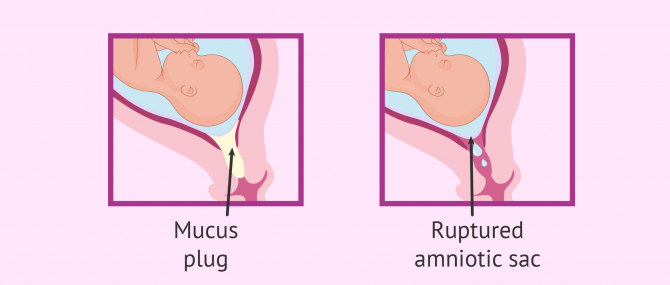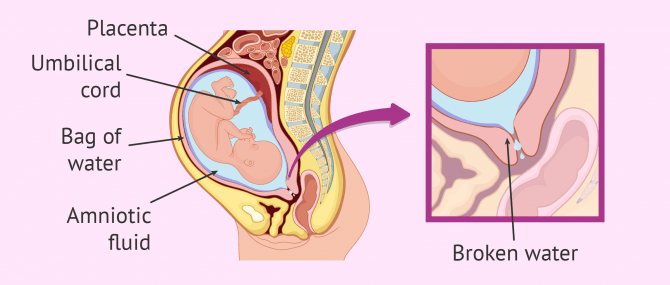Leaking amniotic fluid or having symptoms of amniotic fluid leakage is a concerning situation for pregnant women. Indeed, the amniotic fluid is a crucial element for the proper development of the fetus inside the womb till the moment of birth.
Provided below is an index with the 9 points we are going to expand on in this article.
- 1.
- 2.
- 3.
- 4.
- 5.
- 6.
- 6.1.
- 6.2.
- 6.3.
- 7.
- 8.
- 9.
What's the function of the amniotic fluid?
The wide number of functions associated with the amniotic fluid explain the importance of having a normal amount of it during pregnancy:
- To regulate fetal temperature
- To facilitate the exchange of nutrients
- To serve as a cushion for the growing fetus
- To allow for easier fetal movement
- To promote proper fetal lung growth
- To facilitate delivery
From the second week of pregnancy onwards, the amniotic fluid is mainly composed of water. As the pregnancy progresses, it incorporates proteins, carbohydrates and electrolytes that promote fetal growth. The fetus feeds from all of them by swallowing amniotic fluid and excreting it as urine.
Even though it occurs rarely, your water or amniotic sac may break, which can cause the amniotic fluid to leak slowly. Leaking amniotic fluid can harm your baby.
Am I leaking amniotic fluid or urine?
To make sure whether you are leaking amniotic fluid or not, the first thing to do is examining your underwear. If you were leaking amniotic fluid, you would see a watery, odorless discharge on it. It has nothing to do with vaginal discharge or urine leakage.
While vaginal discharge is more or less viscous, urine has a particular smell and color that makes it easily distinguishable.
If you still have doubts, we recommend that you use a self test detector such as AL-Sense. It can be purchased at the pharmacy and is very easy to use. It works exactly like a panty liner or sanitary pad—all you have to do is wearing it inside your undies in order to detect potential amniotic fluid leakages.
The pad contains a test strip that acquires a different color depending on the origin of the fluid. If it turns yellow, it's a case of urine leakage. On the contrary, it would mean that you are leaking amniotic fluid if it turned blue or green.
How do you know if your water has broken or is leaking?
Leaking amniotic fluid at the final stages of pregnancy can be a concerning issue for the pregnant woman, as she is not sure whether labor is beginning. Moreover, if your water breaks earlier than expected, it may be an indicator of preterm labor or even miscarriage.
There are no other signs associated with amniotic fluid leak. In fact, this is the reason why it can be considerably difficult to know if it is a case of water breaking or not. If you can't tell where does the fluid leak from, the following tips may be helpful:
- Pee to empty your bladder fully, to know if you are leaking urine or not.
- Put a cloth or towel that is dark in color in your underwear.
- Have a walk and cough several times.
Should your water be broken, you would see a large stain on the cloth/towel. On the contrary, it would be dry or you may see just a little bit of discharge if water breaking hasn't occurred.
When in doubt, we always recommend that you visit your doctor. He or she will take a sample of fluid to examine it and determine whether you are actually leaking amniotic fluid or not.
Amniotic fluid leakage causes
The following are the most common causes of amniotic fluid leakage:
- Congenital infections or trauma: They weaken the membranes and facilitate their rupture.
- Amniocentesis: Even though the fissure heals over time and the leakage stops eventually, it can cause you to leak some fluid. For this reason, rest is recommended before an amnio test.
- Pregnancy complications: Early detachment of the placenta before your baby is born, fetal malformations, or intrauterine growth restriction (IUGR).
- Family history: It is more likely to occur in women with a family history of amniotic fluid leakage.
- Early contractions: Having uterine contractions before your due date (high risk of preterm birth) can lead to an early leaking of amniotic fluid.
- Overstretching of the uterus: Caused by polyhydramnios or a multiple pregnancy.
Diagnosis & treatment
Leaking amniotic fluid often leads to fetal malformations, fetal renal anomalies, or fetal growth abnormalities.
If there is the slightest suspicion that you are leaking amniotic fluid, you should visit your doctor at once in order to have your levels of amniotic fluid and the overall state of your pregnancy monitored through ultrasound.
Although keeping your water from breaking is complicated, it's important to follow the appropriate treatment. If you have the slightest suspicion that your baby is at risk, your doctor may decide to induce labor prematurely if you are in the later stages of pregnancy.
FAQs from users
What does leaking amniotic fluid feel like?
To know whether it's amniotic fluid or urine, we recommend that you lie down for about 30 minutes and then stand. If you feel a small gush, then it could certainly be amniotic fluid. If this is your case, visit your doctor at once.
Can amniotic fluid leak out slowly?
Yes, it can happen when the sac has a small hole and the amniotic fluid drains slowly.
Can your amniotic fluid leak and then stop?
Yes, it can happen after an amnio test for instance. When a small rupture occurs, the two layers of the membrane can slip back over each other, thereby resealing the opening. Anyway, our advice is that you contact your doctor as soon as possible.
Suggested for you
During pregnancy, some women experience alterations of the amniotic fluid, aside from the one described herein. Other complications are associated with an excess or shortage of amniotic fluid. If you're interested in learning more, check this out: Alterations in Amniotic Fluid Volume.
Also, polyhydramnios is an excessive amount of amniotic fluid during pregnancy. Want to know what to do if it occurs? Continue reading here: What Are the Dangers of Polyhydramnios?
We make a great effort to provide you with the highest quality information.
🙏 Please share this article if you liked it. 💜💜 You help us continue!
References
Author





Hi, just wanted to share with all of you how sad i am at the moment… A few days ago, i lost my baby at the 19th week of pregnancy. I started leaking amniotic fluid a few days earlier and went immediately to the dr. She said it was amniotic fluid… It started to leak slowly, then it became more abundant. She said nothing could be done and I ended up losing my baby. I think I’m having depression symptoms… I wanted to know, is there anything I did wrong during the 1st weeks? Anything that I didn’t do? Is there any way for it to be prevented?
Dear Melissa,
As explained through this post, when a pregnant woman starts leaking amniotic fluid, keeping it from leaking is unfortunately not possible. it can occur due to various reasons, but I’m afraid you cannot control it, and they don’t depend on you or your actions. So don’t blame it on you. I’m very sorry for your loss.
Wishing you all the best